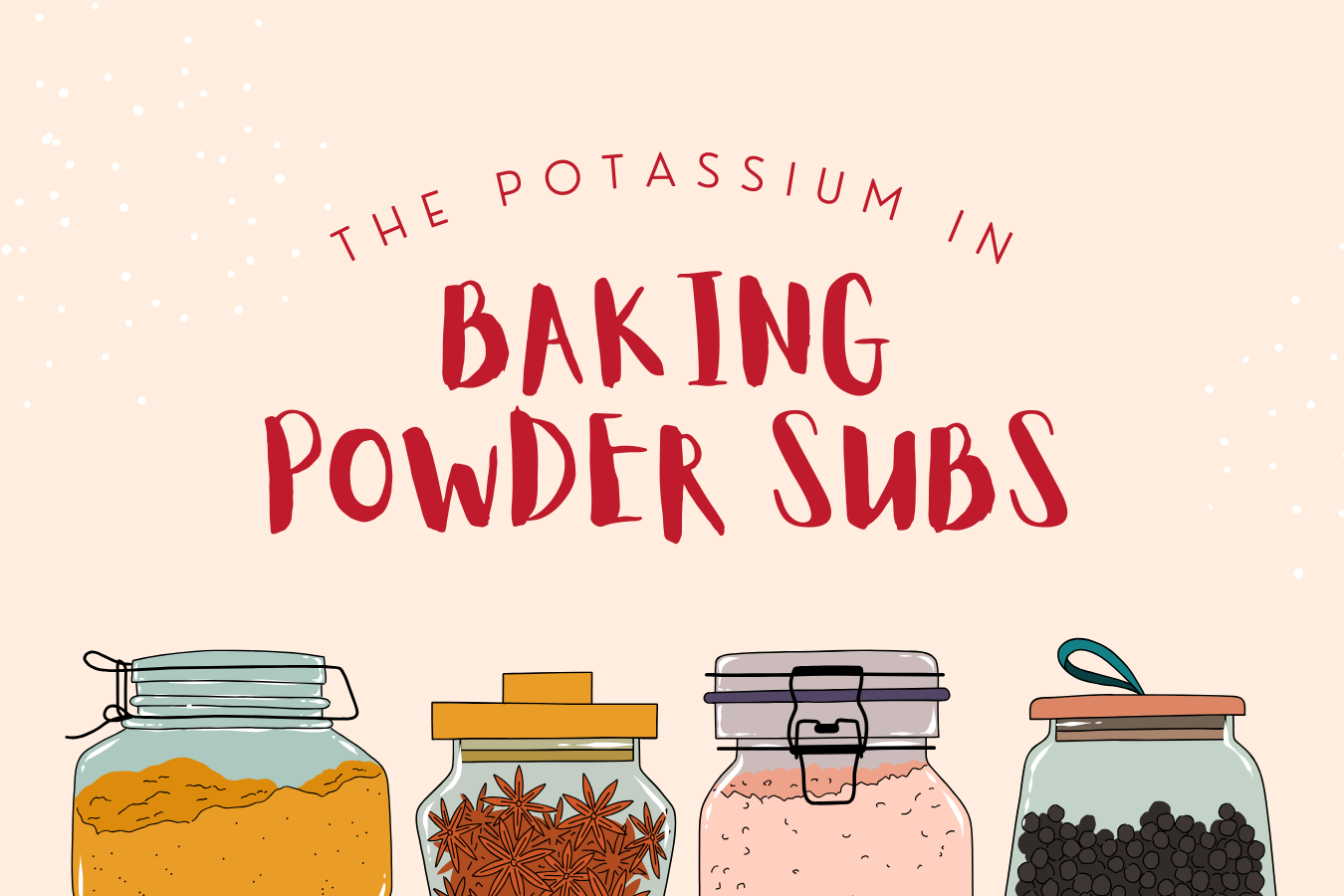Not too long ago, I was asking a question about the phosphorus content of baking powder. I did some math to calculate the phosphorus content of baked goods made with baking powder that contains sodium phosphates.
Based on the math, chocolate cake contained 38mg of phosphorus from baking powder, but a baking powder biscuit contained 225mg. If we think of this in terms of the RDA for phosphorus at 700mg, that baking powder biscuits accounts for 32% of the recommended phosphorus intake for a day. That’s quite a bit.
I had suggested trying a baking powder substitute recipe – such as this one. But a very astute reader pointed out that they worry how this substitute changes the mineral content in other ways.
What is a standard baking powder substitute recipe?
2 parts cream of tartar and 1 part baking soda. Seems harmless, right? But another name of cream of tartar is potassium bitartrate – a potassium additive.
I looked up the mineral content of these items in the Canadian Nutrient File. Here is the breakdown per 100g.
| Sodium | Potassium | Phosphorus | |
| Baking soda | 27360 | 0 | 0 |
| Cream of Tartar | 52 | 16500 | 5 |
| Baking powder | 7893 | 5 | 9918 |
This means that cream of tartar is 16.5% by weight potassium. And while this substitution recipe helps us eliminate the phosphorus, we replace it potassium. Another mineral of concern!
How would this change the mineral content in baked goods?
Using the same recipes that I used for my previous post, but subbing out the commercial baking powder with our homemade baking powder, here is the sodium and potassium content from the baking powder alone.
For these calculations I am using the Canadian Nutrient File K and Na amounts that 1tsp of cream of tartar weighs 3.1g and contains 505mg of potassium and 2mg of sodium. For baking soda 1tsp weighs 4.7g and contains 0mg of potassium and 1284mg of sodium.
| Recipe | Baking Powder | Homemade baking powder | Yields | K* in recipe | K* per svg | Na* in recipe | Na* per svg |
| Pancakes | 3.5 teaspoons | 1.16tsp baking soda, 2.33 tsp cream of tartar | 8 pancakes | 1177mg | 147mg | 2136mg | 267mg |
| Biscuits | 1 tablespoon | 1 tsp baking soda, 2 tsp cream of tartar | 6 biscuits | 1010mg | 168mg | 1284mg | 214mg |
| Blueberry Muffins | 2 teaspoons | 0.66 tsp baking soda, 1.33 tsp cream of tartar | 8 muffins | 672mg | 84mg | 874mg | 106mg |
| Chocolate Cake | 2 teaspoons | 0.66 tsp baking soda, 1.33 tsp cream of tartar | 24 slices | 672mg | 28mg | 874mg | 36mg |
| Waffles | 4 teaspoons | 1.33tsp baking soda, 2.66tsp cream of tartar | 10 waffles | 1343mg | 134mg | 1708mg | 171mg |
The difference summary
In case you are getting as tired as I am flipping back and forth between my two blog posts – the take away differences are:
- The potassium is higher, for some products by quite a bit
- The sodium is higher, again, for some products by quite a bit
- The phosphorus content is way lower
Is this increase in potassium clinically relevant?

If we use a banana for scale – which of course is my favourite potassium scale. Consider that 1 medium banana contains 422mg of potassium. This means that the baking powder biscuits contain about 39% as much potassium as a banana.
So, depending on how many baking powder biscuits your patient is eating, what their normal potassium trends are and how sensitive they are to dietary potassium intake – this may be clinically relevant.
Take Aways
I once heard this expression: “There is no free lunch in medicine.” And you know what – there are no free lunches in nutrition either.
For every action there is a reaction. When someone eats less of one thing, they eat more of another. And sometimes that more of another is better for them but sometimes its worse.
Should you recommend baking powder substitutes for patients? It depends. If they have hyperphosphatemia and normokalemia, then it is probably a good sub. However, if they have hyperphosphatemia AND hyperkalemia AND they eat a lot of baked good – then it probably isn’t a great sub. And it may be worthwhile to check out my hyperkalemia assessment checklist to see if there is something we can do about their hyperkalemia.
Thanks so much for sending this comment in! I really enjoyed this post and it is fun to work out the numbers. If you have a question or comment don’t hesitate to email me at contact@kellypicard.com
And before I forgot
I forgot to mentioned that my baking powder post also got me this blog post emailed my way. Its a UK kidney resource and has some other good ideas about kidney-friendly baking. Check it out. Its pretty cool.



